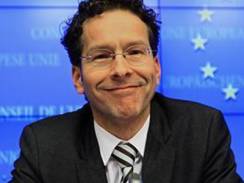By Melyvn Krauss, Bloomberg
How is it that a man like Jeroen Dijsselbloem, with no knowledge of or experience in financial markets, can get appointed to lead the euro-area group of finance ministers, one of the most influential and sensitive jobs in Europe?
Dijsselbloem may be the Netherlands’ finance minister, but his background is as an agricultural economist and right-hand man to the head of the Dutch Labor Party. Neither his training nor his experience gives him insight into the workings of currencies or global financial markets.
Mark it up to the way business is done in Europe. It’s an important source of the missteps that the euro area has made in trying to resolve its debt crisis.
Luxembourg’s Jean-Claude Juncker left the leadership post in January. The Germans didn’t want a Frenchman to replace him, and the French didn’t want a German in the job. Nothing new there. So the two largest euro-area countries compromised. They picked a Dutchman because Holland is a small country (Luxembourg is even smaller) and hasn’t had a senior European Union appointment in a long time. Merit didn’t enter the equation.
Sowing Doubt
Dijsselbloem’s contributions to the contentious Cyprus bailout negotiations last week bear out his lack of experience and may yet do real damage to the euro area by sowing ever more doubt in the minds of investors and depositors about the intentions of the currency zone’s top policy makers.
This is an endemic problem for the EU, where political horse-trading can leave underqualified, second-rank candidates in top positions, from the European Commission to the high representative for the bloc’s common foreign policy. Perhaps the large countries such as Germany prefer it this way, to keep power centered in their national capitals — but this comes at a severe cost.
Imagine for a moment what situation the U.S. economy would be in if Treasury secretaries were picked in the same way — on the basis of what part of the country they hailed from and which state was next in line for a big job.
You might not like their policies or connections to Wall Street, but Timothy Geithner and Henry Paulson are experienced professionals. Dijsselbloem is by comparison an inexperienced amateur in finance, who talks bluntly and has a strong streak of Dutch morality. Other top European officials, who do know what they are doing, were seething with anger after he told reporters last week that the latest Cyprus deal, which includes closing a bank and bailing-in depositors, should serve as a template for the entire euro area.
Did Dijsselbloem think for an instant about what impact his so-called template surprise would have on financial markets? Did he consider, for example, that small banks in Italy, Portugal and Spain would face increased stress due to an exodus of funds now searching for safer harbors? Or that large depositors all over the euro area would now have a strong incentive to get out of European banks and the euro, causing damage to both?
Europe’s banks are fragile as it is. The last thing they needed was for a Dutch moralist to freelance his personal views as the euro area’s bailout policy.
Dijsselbloem already showed a penchant for making investors in ailing banks pay, when only a few weeks ago he nationalized SNS Reaal, a Dutch lender, wiping out bondholders in the process. But EU officials were stunned when the novice used the Cyprus crisis to publicly campaign for his stern approach for the entire euro area, at a time when EU officials were trying to convince investors that Cyprus was a special case, precisely so that they wouldn’t take flight. This rookie needs be taken out to the woodshed.
Perceptions Matter
Damage control is under way, starting with Dijsselbloem’s rapidly recanting his template comments. Yet the cat is out of the bag — large depositors in euro-area banks will adjust to what they now see as the coming policy in Europe. In cases like this, perceptions matter.
Dijsselbloem’s message — that investors must pay more and taxpayers less in bailing out distressed banks — plays well in Calvinist Holland. But he was appointed the leader of the group of euro-area finance ministers to represent the collective views of the 17 member countries, not to be an avatar of Dutch moral principles.
Dijsselbloem’s template surprise was his second major blunder during the Cyprus bailout negotiations. The first was his willingness to sign off on Cyprus President Nicos Anastasiades’s proposal to impose a deposit tax on government insured deposits of less than 100,000 euros ($129,000).
Faced with the need to raise almost 6 billion euros to get 10 billion euros of help for bailing out the nation’s two biggest banks, the president of Cyprus insisted that government-insured small depositors should be taxed, so as to reduce the burden on the uninsured big depositors, most of them Russians. Not for nothing are the Germans calling Cyprus a “gangster economy.” French Finance Minister Pierre Moscovici called it a “casino economy.”
Anastasiades claimed the Cypriot parliament would rubber-stamp the agreement, and Dijsselbloem signed off on it, together with representatives from the European Central Bank and the International Monetary Fund, who must also shoulder part of the blame.
What a blunder. By signing off on a deal that would enable Anastasiades to keep doing business with Russian depositors, Dijsselbloem and his counterpart in the ECB risked serious bank runs throughout the euro area. These are the kinds of unpardonable mistakes that raise questions about whether the European leadership knows what it is doing.
The euro has its faults, it is true, but they are solvable. What makes exiting the crisis so difficult for Europe is the poor quality of its political leadership. Europe was asking for trouble when it put a newcomer like Dijsselbloem into such a senior and sensitive financial job without giving it a second thought — and it got that trouble in spades with Cyprus.
The final agreement reached with the Cypriot government turned out to be constructive, but the route there was made unnecessarily circuitous and expensive by officials who don’t understand how markets operate.
(Melvyn Krauss is an emeritus economics professor at New York University and a senior fellow at the Hoover Institution at Stanford University. He writes regularly for several European newspapers, including Handelsblatt in Germany and NRC Handelsblad in the Netherlands. The opinions expressed are his own.)


















